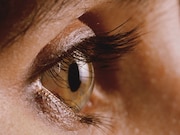In eyes with good visual acuity, no difference in vision loss found two years after initial treatment
FRIDAY, May 3, 2019 (HealthDay News) — For eyes with center-involved diabetic macular edema (CI-DME) and good visual acuity, vision loss does not differ after initial management with aflibercept versus laser photocoagulation or observation, according to a study published online April 29 in the Journal of the American Medical Association.
Carl W. Baker, M.D., from the Paducah Retinal Center in Kentucky, and colleagues compared vision loss at two years in a randomized trial involving 702 adults with type 1 or type 2 diabetes. Participants had one study eye with CI-DME and visual acuity of 20/25 or better. Eyes were randomly assigned to 2.0 mg of intravitreous aflibercept (226 patients) as frequently as every four weeks, focal/grid laser photocoagulation (240 patients), or observation (236 patients). For eyes in the laser photocoagulation or observation groups that had decreased visual acuity of at least 10 letters from baseline, aflibercept was required (initiated in 25 and 34 percent, respectively).
The researchers found that at two years, 16, 17, and 19 percent of eyes had at least a five-letter decrease in visual acuity in the aflibercept, photocoagulation, and observation groups, respectively (relative risks: 0.88 [95 percent confidence interval, 0.57 to 1.35; P = 0.79] for aflibercept versus laser photocoagulation; 0.83 [95 percent confidence interval, 0.55 to 1.27; P = 0.79] for aflibercept versus observation; and 0.95 [95 percent confidence interval, 0.64 to 1.41; P = 0.79] for laser photocoagulation versus observation).
“Observation without treatment unless visual acuity worsens may be a reasonable strategy for these eyes,” the authors write.
Several authors disclosed financial ties to pharmaceutical companies, including Regeron, which provided aflibercept for the study.
Copyright © 2019 HealthDay. All rights reserved.








